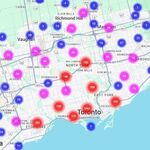Hard to buy votes with OpEx, always looks better when you’re buying shiny new things with CapEx. I’d say John Tory has been more egregious on the front of funding operations, and we can see the effect of that every day on the TTC, in our parks, on our streets, etc. The issue is now is the exact worst time to raise taxes, when the economy is in/entering a recession. If we wanted higher municipal revenue, the time was when the economy was growing, now it’s both politically and economically a difficult choice to make. We could be worse off though, considering that we already have a federal government that is loath to invest in/create their own infrastructure projects, having a provincial government that also avoided CapEx would certainly set our infrastructure back decades,
I essentially agree with what you're saying above.....but I do want to break some of it out.
Hard to buy votes with OpEx, always looks better when you’re buying shiny new things with CapEx.
Oddly, I think this isn't true. I know its common political instinct to cut ribbons. But I think operating investments can actually produce better, results w/the public, done properly. Let me acknowledge, up front, that small increases or decreases in personnel don't really move votes; and further that jobs that aren't public facing, or where the results of any under-staffing aren't seen quickly can be a tempting place to 'cut' from a political perspective to fund something with more flash.
But the thing w/operating expenses in many areas it that a wise increase can be seen and felt quite quickly, where a capital project may take years to come to fruition.
As an example, most Toronto recreation centres close mid-afternoon on Saturdays and Sundays around 4pm'ish.
For a comparatively small sum, 10-15M per year, you could open most of those facilities until 10pm on weekends. Not only would them being open be instantly felt, but so would reduced crowding in earlier portions of those weekend days.
Likewise, strategic improvements in TTC service can be felt pretty quickly. Particularly for routes w/low service frequency. Taking an every 20M bus to every 15M is possible on many routes by adding a single bus to one shift. Most long-haul routes w/lots of vehicles are already more frequent.
So if you took 10 low-service routes and bumped them to every 15M or better, you might be able to do that for 5M per year. Boost overnight frequency for about the same; add some additional overnight routes for maybe 10M per year.
Taken in the context of a 15B budget, these are relatively small sums that can create a very visible effect and a halo for politician who delivers them.





